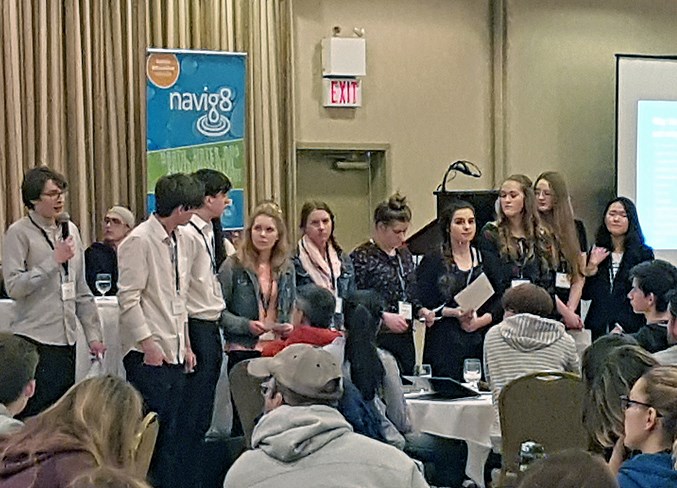The Sundre High School Polar Bear Express team recently presented at the Navigate youth environmental summit in Canmore.
The field trip was part of a followup from research the students did on bone density loss in polar bears associated with exposure to PCBs, a now-banned man-made chemical once used in manufacturing.
The conference was held from March 8-11 in Canmore, and the team from Sundre presented on March 10 at Inside Education, which hosted the event, said Ryan Beck, Sundre High School science teacher.
At each table sat a team of youth leaders, accompanied by their teachers, from a different Alberta high school.
“Our kids lead these leaders and inspired these change makers. They were rock stars and were swarmed by fans wanting to know how they became so accomplished and made such a cohesive team,” wrote Beck in an email.
According to its website — navig8.ca — Navigate is an opportunity for students and teachers to: gain insights from experts, innovators and young leaders; engage in hands-on workshops and demonstrations that bring water and environmental issues to life; expand networks and create lasting memories with like-minded students and teachers; explore the important and timely issues of climate change and water in our province; as well as attend a professional summit that reduces its environmental impact by choosing sustainable practices.
Steve McIsaac, Inside Education’s executive director, wrote in an email that 20 high schools from across the province — including as far north as Fort McMurray and as far south as Kainai Nation School — each sent four students and two teachers, for a total of 80 students and 40 teachers.
“Navigate 2018 was Inside Education’s eighth annual youth leadership summit,” he said.
“We alternate the theme year over year with water the focus in even number years, energy and climate in odd number years.”
Following the end of the three-day summit, all 20 high schools will develop and deliver action plans for their schools and communities, he said.
Mr. Beck’s students were meant to share their story and inspire other students, “showing them the incredible things the Sundre students did, and motivating the other students to strive for goals that might seem hard to attain,” he said.
“They might not go to study polar bear bones, but they’ll be inspired that the Sundre students did this amazing thing — ‘Why can’t we try something equally amazing!’”
On behalf of the Sundre students, Inside Education offered a modest donation to the Centre for Affordable Water and Sanitation Technology, he said.
“For each of our programs, we pick a charity of choice that we donate funds to instead of buying coffee mugs or other trinkets to say thank you to our expert speakers.”




